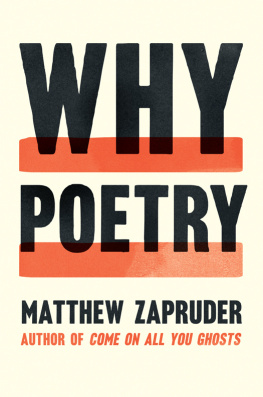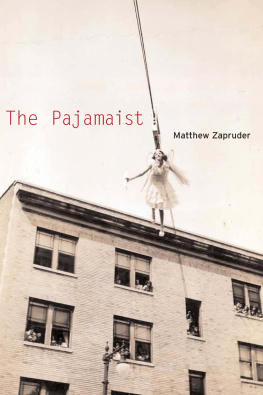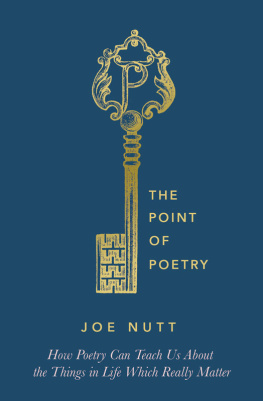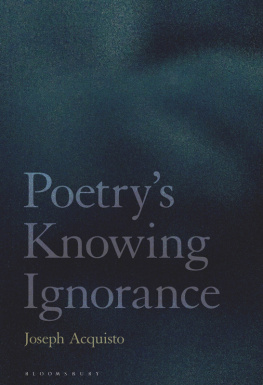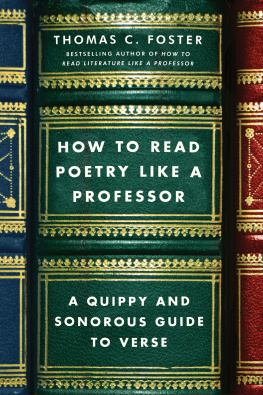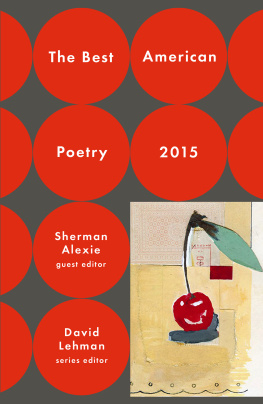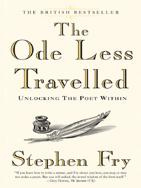FOR MY FATHER
and for Sarah and Simon
Stop this day and night with me and you shall possess the origin of all poems...
WALT WHITMAN
Extreme clarity is a mystery.
MAHMOUD DARWISH
The poet is always our contemporary.
VIRGINIA WOOLF
CONTENTS
Guide
I HAVE A CONFESSION TO MAKE: I DONT REALLY UNDERSTAND poetry. For over twenty-five years, I have heard this said, over and over in slightly different ways, by friends, family, colleagues, strangers I met in bars and at dinner parties, on planesso many people, practically everyone who found out I was a poet. Clearly, there is something about poetry that rattles and mystifies people, that puts them off, that makes them feel as if there is something wrong. Maybe the problem is with them as readers. Maybe they dont know enough or havent studied enough or werent paying attention in school. Or maybe the problem is with poetry itself. Why dont poets just say what they mean? Why do they make it so hard?
Around ten years ago, I had published two books of poetry and was traveling extensively around the United States and parts of Europe giving readings. I was also teaching poetry at a variety of colleges and universities, to a wide range of students. I kept hearing some version of that confession. And I kept having the same sorts of conversations, in which I would attempt to explain, stumblingly, what I believed about poetry, how I thought it made meaning, why I thought it was not difficult in the ways that we had been taught in school.
Later, I would each time always wish I had said it all differently, more gracefully, more completely. So, I thought, I will write a book. In it, I would explore what it is about poetry that makes people feel that they dont understand it. I would take seriously the objections people have, and try to address those objections clearly and simply, in order to explore what poetry is, and why, despite its supposed difficulties and obscurities, so many people still write and read it.
I was immediately excited about this big, impossible plan. I knew the main idea would be that poetry does something different than all other forms of writing and speech, something essential, something we need.
I would demonstrate this by writing about old poems, and also contemporary ones. I would discuss the mechanisms of poems: form, and rhyme, and metaphor, and symbols. I would reveal that what is strange about poetryits dream logic, its interest in the slipperiness and material qualities of language, its associative daydreaming movementis not some deliberate obfuscation, or an obstacle to communication, but essential to the very way poetry makes meaning.
Also, I would write about how the increasing pervasiveness of connective technology has made the contemplative, speculative, drifting yet attentive awareness poetry can bring ever more rare and necessary. I would write about how poetry can move us closer to what is vital and elusive, what can never be fully explained. I would write about contradiction, about Keatss formulation of negative capability, about Lorcas duende, and about the utopian dreams of the Surrealist poets. I would write about the excellence of dictionaries, and the necessity of getting literal with language, and how the slippery, provisional nature of language itself is intimately related to the power of poetry. I would also not leave out the way poems communicate ideas, the way they can feel so truthful and wise.
I began to take notes, to read, to write down thoughts. I kept talking with people, running my ideas by them. I changed my mind, again and again.
In 2007, I met my future wife, Sarah, and then a year later moved to San Francisco, where she lived. I stopped traveling so much, and was able to begin assembling an actual book. As I wrote and rewrote, I discovered that, beyond the elusiveness and the variety of the subject matter, there were fundamentally difficult, even paradoxical obstacles to writing a book about how to read poetry.
For one thing, the act of treating poetry like a difficult activity one needs to master can easily perpetrate those mistaken, and pervasive, ideas about poetry that make it hard to read in the first place. Like classical music, poetry has an unfortunate reputation for requiring special training and education to appreciate, which makes most of us feel (unnecessarily) as if we havent studied enough to read it. In his widely read introduction to The Best Poems of the English Language, Harold Bloom writes, The art of reading poetry begins with mastering allusiveness in particular poems, from the simple to the very complex. This is not true. The art of reading poetry does not begin with thinking about other cultural products, or historical moments, or great philosophies. It begins with reading the words of the poem, which sounds very simple, and is, except that it quickly becomes very interesting. Reading poetry, we need to remember that we are all experts in words; we have been for a long time. And any word we dont know we can look up in the dictionary that will always be beside us when we read.
To learn to read poetry is first a matter of forgetting many incorrect things we have learned in school. And then of learning to accept what is right before us on the page. A big part of what the book needed to do, I realized, was to demonstrate ways of reading poetry that would resimplify and redirect our attention toward the purpose of poetry.
The question was not really what poetry is (poems can be so many things), but why it is written, and what it does. It seems that our inability to grasp why we are reading poetry, for reasons fundamentally different from why we read all other forms of writing, is what makes poetry so hard to understand.
To explore why we read poetry and what it does, it is necessary to talk about the experience of reading poetry. The problem is, that experience is an elusive one to try to capture in words. For one thing, it differs from person to person, though there are some commonalities about the genre of poetry, its function and effects, that we can discuss. More important, when a person truly falls in love with a poem, it is usually because it feels like a private experience. Moving through the poem, the reader feels a kind of understanding that is hard to paraphrase or resay. Therefore, the essential knowledge of a poem, what can make it feel so necessary, cannot ever fully be put into other words. The better the poem, the harder it is to talk about it.
John Ashbery writes in Paradoxes and Oxymorons that experiencing a poem is:
A deeper outside thing, a dreamed role-pattern,
As in the division of grace these long August days
Without proof. Open-ended. And before you know
It gets lost in the steam and chatter of typewriters.
Ashberys poem points to that feeling of being just on the verge of knowing, and even for a moment knowing, something the poem has told us, something vital. But before you can hold on to that knowledge, it is gone, at least until you read the poem again. The experience of getting close to the unsayable and feeling it, and how we are brought to that place beyond words by words themselves, is the subject of this book.
Poetry isnt in any danger, and never has been. It has thrived for the entirety of human history, or at least as long as we have been using language to communicate, and I am quite sure that there will be poetry as long as there are people who can speak, and probably even after. Probably even robots will write it, just as soon as they get souls. No matter what we say about it, or dont, poetry inevitably will (as Auden wrote) keep surviving in the valley of its making.
But for so many of us, that does not seem to be enough. People carry so many incorrect ideas about poetry into their readings of it, ones that ruin the experience before they even get to have it. Also, there is a lot to say about poetry, interesting ways of thinking about it out loud and in writing that can bring us closer to it.

